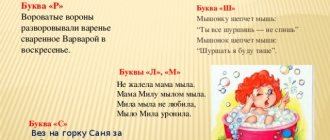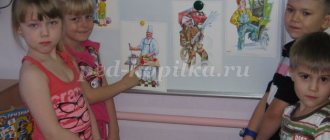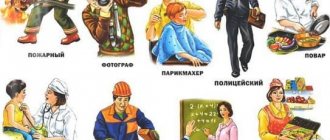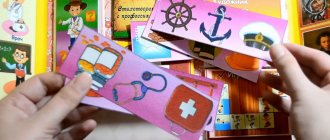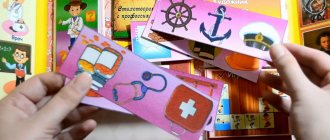General recommendations for conducting speech therapy classes on the topic “Professions” in a preschool educational institution
When conducting a speech therapy session “Professions”, it is important to take into account the characteristics of children’s perception. Children do not yet have self-discipline skills. Therefore, it is important that the activity is playful in nature and captivates them.
Developmental activities for classes
When conducting classes, not only games can be used that expand the children’s knowledge, but also exercises to learn how to correctly pronounce sounds in words and improve speech skills. It is recommended that you plan your children's learning in the coming weeks.
Games on the topic: “Professions”
In this case, riddles and questions are asked, the answers to which expand the children’s knowledge about various specialties. Sometimes false statements are made so that kids will find a mistake.
Stories relating to various specialties are compiled.
List of reading materials for the group
When lexical topics in speech therapy related to professions are considered, for example, reading the following works can be used to work with children:
- J. Rodari “What color are the crafts.”
- Y. Akim “Neumeika”.
- A. Shibarev “Mailbox”.
Note! Reading and discussing works of fiction will help children better understand the topic they are studying. It is useful if such readings are additionally carried out by their parents at home.
Thematic physical education minute
The following describes one example of physical education.
Kids perform movements while the teacher reads the poem “Postman”:
What the postman brought us (Clenches his fists)
He walks around with a thick bag
Translation, magazine, newspaper
There are two cassettes in the parcel (Kids straighten and bend their fingers)
And a letter from Aunt Valya
So that they await her arrival (Hands spread to the sides).
Gymnastic exercises
Typically, physical exercises and finger gymnastics are used during classes. At the same time, the teacher reads a poem related to the topic under consideration. At certain moments, children perform movements that relate to the spoken phrases. If necessary, the teacher tells you what to do.
Using interactive whiteboards and ICT in the learning process
The use of ICT makes it possible to offer children exciting educational computer games.
For example, they may be offered pictures of people and objects that they use in their work. At the same time, children will have to describe in words what is shown in the pictures and write a short story about this profession. The use of computer technology can expand the learning opportunities for preschool children. However, it is necessary to teach children to work with it in subgroup classes.
Age characteristics and correction of speech disorders during group classes
Knowledge of the peculiarities of the lives of adults related to their work is vital for children, but at different ages the approach to studying issues related to professions should be different. He must take into account the age characteristics of the children.
Poster about different professions
Lexical topic “Professions” in the middle group
Classes in the middle group not only develop speech skills, but also provide basic knowledge about what professions are and what they are like.
Purpose and objectives of the lesson: getting acquainted with different professional specialties
The following tasks are performed:
- When working with children, they are given the concept that there are different professions and are told about their main features.
- Vocabulary develops, articulation improves when pronouncing sounds.
- Children develop auditory attention and logical thinking.
It is recommended to plan classes for the near future.
Brief lesson plan
Finger gymnastics is performed with children. It is done as follows:
The use of mnemonics in the development of speech in preschool children
There are many noble professions (In this case, in turn, each finger of the right hand is connected to the thumb).
Both useful and pleasant (Make the same movements with the fingers of your left hand).
Cook, doctor, painter, teacher, salesman, miner, builder (Connect the fingers of the left hand and right hand with the thumbs).
I don’t name everyone at once (at the same time, the kids clench and unclench their fists several times).
I suggest you continue (children stretch their arms forward, keeping their palms facing up).
Next, the teacher conducts a poetic dialogue with the kids: “Was there a shoemaker?/Was!/Sewed boots?/Sewed!/Who are the boots for?/For the neighbor’s cat!” This exercise is designed to improve the clarity of diction and work on the expressiveness of the pronunciation of sentences.
The lesson uses tongue twisters to develop clarity of pronunciation and correct pronunciation of various sounds. At the same time, the teacher and the children try to pronounce certain phrases. Here is an example of a tongue twister: “The leaking faucet really wants the plumber to fix it.”
Important! Throughout the lesson, children are given a variety of vocabulary exercises.
Thematic poems and tongue twisters
The poetic form of presenting material to children helps them better assimilate the material. Therefore, it is important to use poems and read them aloud to the teacher together with the children. One of the exercise options is to ask poetic riddles.
Here are some examples:
- “Doctor, but not for children, but for birds and animals. He has a special gift. This doctor..." (Vet).
- “We teach children to read and write. Love nature, respect the elderly." (Teacher).
- “At work, day after day, he commands with his hand. That hand raises. A hundred pounds under the clouds." (Crane operator at a construction site).
Tongue twisters not only allow you to improve your vocabulary, but also provide an opportunity to improve children’s diction.
The following tongue twisters can be used:
- “Sailors in sailor suits. Sailor suits in stripes."
- “Two woodcutters, two woodcutters are chopping wood with axes in the yard.”
- “The weaver is weaving fabric for Tanya’s dress.”
When working with children in a speech therapy lesson on the topic “Professions,” the following game can be used. It's called "Fable Poems."
Its goals are: improving auditory attention, improving the ability to think logically, and developing children’s vocabulary related to the topic of professions.
The game consists of reading poems about the professions of adults to children, and in them the teacher makes erroneous statements. Kids are required to determine what is true and what is not. At the same time, the speech therapist and children discuss the answers in detail.
Lexical topic “Professions” in the senior group
Important! At this age, children are able to master not only basic concepts about various specialties, but also begin to create general ideas about the world of adults and the place that professional activity occupies in it.
Objectives of the lesson: forming a holistic picture of the world
Children are taught to briefly talk about their professions. During the lesson, they learn more about the types of activities adults do. When assignments are completed for children in the speech therapy group on the topic “Professions,” children are taught that work is necessary and its social significance is explained.
Kids are trained to form masculine and feminine words from the names of workers (military and military, teacher and teacher).
Note! Children develop the ability to recognize speech by ear, improve visual perception and attention. They are helped to develop memory, attention and the ability to speak coherently.
Children are encouraged to be active, take initiative, and have the ability to work collectively.
Lesson outline
When considering lexical topics in the senior group, a thematic physical education session first takes place.
A conversation is held about what a profession means for an adult. They talk about how there are different professions and give relevant examples. They talk about the need to earn money to buy household items that the family needs.
Peculiarities of mastering the sound aspect of speech by preschoolers
The story is told on behalf of the kids who were arguing about whose profession was more important. The teacher and children discuss this dispute and give their answers.
A rhyming game is being played. For example, phrases are uttered about professions related to transport: “The train is driven by ... (driver). Plowing the field... (Tractor driver)..." Children must complete each phrase.
Children take cards out of envelopes and see pictures of a person working. They should talk about his specialty.
Children, with the help of a teacher, compose their stories about various professions, guided by a rough plan and pictures.
A physical education session is held. At the same time, poems about professions are read, during which children imitate the corresponding movements.
The teacher gives phrases, and the children guess who could say them.
Kids are asked to name workers in masculine and feminine genders (for example, pilot).
In conclusion, the results are summed up, the teacher reminds the children what new they have learned.
Game technologies in education
In the process of working with children, lexical exercises are actively used and physical education sessions are held. Children are taught to independently compose simple stories about various specialties. Questions and riddles are actively used, to which children must find the answer.
Lexical topic “Professions” in the preparatory group
At this age, it is important to prepare people for school, to give them knowledge of how adults live.
Purpose and objectives of the lesson
In classes with preschoolers, it is necessary not only to expand the vocabulary related to the topic under consideration, but also to form their horizons, make knowledge more systematic, develop children’s communication skills, and the ability to coherently express their thoughts.
Activities
At this time, physical education and game moments are still important, but the formation of an outlook, the ability to express one’s thoughts and the ability to conduct a focused dialogue with other people are of particular importance.
Preliminary work on studying literary material
The teacher tells the children about descriptions of various workers that are available in children's literature.
The children read aloud thematic literary works.
Equipment
When the lexical topic “Professions” is considered in the preparatory group, pictures are needed as handouts. They should depict representatives of various professions.
Note! The teacher should have prepared demonstration images on the topic of the lesson.
A board or screen can be used on which visual material will be shown.
Collection of games and exercises on the lexical topic “Professions” For children 5-7 years old. - presentation
Collection of games and exercises on the lexical topic “Professions” For children 5-7 years old
Author of the presentation: teacher-defectologist Marina Anatolyevna Lomonosova.
Contents: In between, Let's play Literary living room
In between times This section presents games and exercises that do not require special organization of space and time; they can be played on the way from the garden, in transport, in general, in between times. TO CONTENTS
CONVERSATION GOAL: Consolidating and clarifying ideas about professions. INSTRUCTIONS: Talk to your child about professions, following the following plan: What is a profession? What are professions for? What do you want to be when you grow up? Try to explain why “all professions are important, all professions are needed”?
I'LL START AND YOU CONTINUE GOAL: to practice using complex sentences. INSTRUCTIONS: Let's play. I will start the sentence, and you finish it. A doctor treats people so that... A builder builds houses so that... A hairdresser cuts people's hair so...
FABLES GOAL: development of verbal and logical thinking. PROGRESS OF THE GAME: The adult says a sentence, the child says whether it is true or not. If incorrect, gives the correct option. For example: Adult: “A gardener is someone who works in a kindergarten.” Child: “Wrong. A gardener is someone who takes care of the trees and shrubs in the garden.” Possible sentences: A cleaning lady is someone who makes hats. A carpenter is someone who makes tables. A carpenter is someone who makes rafts. The driver is the one who drives on excursions.
UNCOVER THE WORD GOAL: formation and (consolidation) of the skill of forming complex words. INSTRUCTIONS: Let's play. You will be a wizard. I will name the words, and you will try to guess what words it came from. LIST OF WORDS: fisherman, lumberjack, beekeeper, chimney sweep, gardener, grain grower***
WHICH? WHICH? GOAL: to train the child in selecting definitions that are appropriate in meaning. PROGRESS OF THE GAME: The child is asked to name as many “beautiful” words as possible. What pilot? Brave, bold. What teacher? Smart, kind. What driver? Attentive, careful. What kind of loader? Strong, mighty. What builder? Skillful, dexterous. Which doctor? Diligent, kind. What kind of dancer? Talented, beautiful, interesting, graceful. What kind of teacher? Kind, cheerful, smart. Etc.
CONTINUE THE SENTENCE GOAL: consolidating ideas about various types of professions, developing the skill of inflection. PROGRESS OF THE GAME: Adult starts the sentence, child finishes Adult: “Transport needs drivers...” Child: “Conductors, drivers, pilots, captains.” Adult: “A tailor works in the studio...” Child: “Seamstress, fashion designer, designer.” Adult: “Furniture cannot be made without the work of a carpenter...” Child: “A lumberjack, a driver, a designer, a seamstress.” Adult: “There are salespeople working in the store...” Child: “Cashiers, cleaners, loaders.” Adult: “Pilots wear uniforms...” Child: “Doctors, police officers, firefighters, machinists.”
Name a female profession GOAL: formation (consolidation) of the skill of inflection PROCEDURE OF THE GAME: You name a male profession, the child changes the word so that it correlates with a representative of a female profession. Cook - cook. Artist -... Tailor -... Teacher -... Violinist -... Singer -... Salesman -... Pianist -... Writer -... Pilot -... Artist -... etc. GAME OPTION: You name a female profession, the child - a male one.
COMPILATION OF A STORY ABOUT PARENTS' PROFESSIONS ACCORDING TO THE PLAN** 1. Last name, first name and patronymic of mother (father). 2. Where does mom (dad) work and by whom? 3. Is this profession male or female? Name the attributes of the profession. 4. Where does mom (dad) work, outdoors or indoors? 5. Who or what does mom (dad) work with (people, animals, equipment, books)?
Let's play Make yourself comfortable with your child at the computer and play together CONTENTS
WHO IS WHAT GOAL: Development of vocabulary on the topic, mental operations, broadening one’s horizons. GAME PROGRESS: Click the mouse. Look at the picture that appears. Ask your child to name the person’s profession and clarify what helped him guess. Invite your child to name the necessary tools for this person's job. Click 4 more times and 5 pictures should appear.
Who's doing what? GOAL: Activating a verb dictionary on the topic INSTRUCTIONS: Click the mouse. Look carefully at the picture that appears. Tell us what a person in this profession does. For example: Cook - cleans, washes, cuts, cooks, fries, cooks, etc. Click 4 more times - 5 pictures should appear.
Tools GOAL: Development of logical thinking, consolidation of knowledge about subjects of labor, practice pronunciation of phrases of 3-4 words. GAME PROGRESS: Click the mouse. Look carefully at the picture that appears. Invite the child to tell: what is drawn on it, what profession does it need, what is it for? Sample phrase from the child: This is a needle. The tailor needs it to sew clothes. Click 3 more times. You should have 4 pictures
Who does what*** Purpose: To train in making sentences. Fix the names of actions performed by people of different professions. Game progress: Click the mouse. Look carefully at the picture that appears. Invite your child to make a sentence based on the picture, following the plan: Who is drawn What is he doing Click 4 more times. You should have 5 pictures.
WHO WORKS ON THE MACHINES? GOAL: formation and (consolidation) of word formation skills. Game progress: Click the mouse. Look carefully at the picture that appears. You ask, the child answers. Works on the tractor (who?) ...tractor driver. Click again. Another picture will appear. Continue the game further. All 4 pictures should appear.
LOOK AND GUESS GOAL: Development and activation of visual attention, holistic perception of an object, visual memory INSTRUCTIONS: Look at the contours. Guess what the artist drew. What professions do people use these items?
RIDDLES GOAL: Development and activation of vocabulary, development of logical thinking, sense of language. INSTRUCTIONS: Let's try to solve the riddles together. STEPS OF WORKING ON A RIDDLE: Read the riddle. Wait a little, perhaps the child will guess what we are talking about, and then there will be no need to move on to the next taps. If you couldn’t solve the riddle, click the mouse anywhere on the screen and the answer will appear. (REMEMBER - when you click the mouse again, a picture of the answer appears.) Ask what words and expressions the child does not understand. Try to explain their meaning in your own words. It is possible that the child will not talk about difficulties with understanding that have arisen (“Everything is clear to me”). In this case, explain those words and expressions that you think are difficult for the child. If the child still finds it difficult, click the mouse - the answer will appear, click again - the answer picture will appear. Name what is drawn. Read the riddle again along with the answer. PRAISE YOUR CHILD
Literary living room This section contains literary material on the topic, riddles, proverbs, sayings. TO CONTENTS
RIDDLES Seryozha coughs loudly. He appears to have bronchitis. They call the clinic, And they say to Seryozha: - Don’t be afraid and don’t cry - A kind... (doctor) is coming to see you. Tell me, who makes cabbage soup so deliciously, Smelly cutlets, Salads, vinaigrettes? (cook)
RIDDLES ABOUT CARS It blinks with a blue eye and immediately rushes into pursuit. (Police car) The house is on fire. Nightmare! She will tame the fire. (Fire truck) Like rain, a car will wash away the dust from the sidewalk. (Water machine) Raises the body upward - Gets rid of loads. (Dump truck)
Let's remember*** GOAL: Activation of vocabulary on the topic, development of memory PROGRESS OF THE GAME: Remember with your child and name literary works about professions; riddles, proverbs and sayings related to work and professions. When you click the mouse button you will see some prompts
PROVERBS AND SAYINGS GOAL: activation of the dictionary, clarification of the meanings of words, development of understanding of the figurative meaning of words. PROGRESS OF THE CONVERSATION: Read the proverbs and sayings. Pick one to start. Explain to your child the meaning of each of the words used in the proverb. Then try to explain its meaning to your child in your own words. Try to use this proverb in your speech over the next few days so that the child begins to better understand its figurative meaning. You can also work with other sayings. Without an ax you are not a carpenter, without a needle you are not a tailor. Go for a walk and don’t forget about things. It is not the needle that sews, but the hands. Handle every task skillfully. Patience gives skill. If you don't sew, you won't become a tailor. Love your work and you will become a master.
WE RECOMMEND READING FOR CHILDREN: Vvedensky V. “The Driver’s Song.” Kardashova A. “Our Doctor.” Sukhomlinsky V. “My mother smells like bread.” Mayakovsky V. “Who to be.” Marshak S. “Mail”, “Fire”. Zakhoder B. “Shoemaker”, “Binder”, “Tailor”. Pogorelovsky S. “Glory to the bread on the table.” J. Rodari “What do crafts smell like”, “What is the color of crafts”
We hope that you spent time with your child with benefit and in a good mood!
Sources of information: BOOKS: Kataeva A.A., Strebeleva E.A. Didactic games and exercises in teaching preschoolers. M, 2001 Pozhilenko E.A. The world around us. St. Petersburg 2004 INTERNET RESOURCES: (only some photographs from these sites were used for the presentation. The author of the presentation is not responsible for the content of the sites) miningexpo.ru ja.wikipedia.org bayun.ru kid-book-museum.livejournal.com rumama. ru
